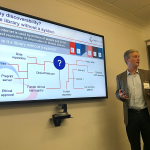In January 2019, Open Pharma core members and supporters attended a roundtable meeting, hosted by The BMJ at its Head Office at BMA House in London. The meeting focused on two Open Pharma workstreams; open access and layered publication platforms. Attendees discussed how open access science can be made more discoverable through platforms powered by complete metadata.
Shire (now part of Takeda) kicked off the discussions on open access by presenting the outcome of its open access policy that came into effect in January 2018. Since its implementation, the proportion of Shire-funded research articles published open access increased from 80% to 91%. The proportion of articles published under a Creative Commons Attribution (CC BY) licence, which allows unrestricted reuse and adaptation of content, increased from 26% to 35%.
The Wellcome Trust then shared its plans to update its open access policy to align with the principles of Plan S – an initiative that focuses on making research publications fully and immediately accessible. As of 1 January 2020, research funded by the Wellcome Trust must be made open access immediately on the date of publication under a CC BY licence. The Open Pharma members and supporters explored the potential for pharma companies to support Plan S and concluded that a position statement of common ground between publishers and pharma companies may be the way forward to increase open access in the industry.
Discussion then moved on to layered publication platforms, highlighting the need and potential ways to link together the various sources of clinical data and research outputs available online, to provide a complete picture to the end user. This would work by directing different audiences to relevant information and data and could increase trust in the data by linking it to the source. The creation of such platforms would therefore address the lack of trust in research data and pharma across all audiences, including medical professionals and, importantly, patients. The consensus by attendees was that creating a platform would be challenging and expensive and would quickly become outdated. However, there could be ways to stimulate interested organizations to create such a publication platform, particularly through encouraging the consistent use of metadata – digital tags that make published materials easy to find online. Publishers and the research community, including pharma, need greater engagement and education about the value of metadata, which could be a critical step towards a potential future with a requirement for complete metadata and use of digital object identifiers for all published material.
For the full meeting report, please click here.






